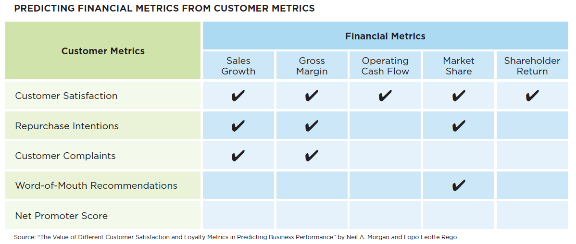We’ve worked with hundreds of companies who primarily measure their customer relationships with one metric: Net Promoter Score (NPS). NPS measures customer experience and predicts business growth by asking one simple question: how likely are you to recommend the company’s product or service? The score is calculated on a 0 – 10 scale based on the response, with those scoring 9 – 10 considered “Promoters,” those scoring 7 – 8 considered “Passives,” and those scoring 0 – 6 considered “Detractors.” The more Promoters you have, the higher your business growth potential is. NPS is seemingly easy to measure and easy for employees throughout the organization to understand.
Marketing and service groups who measure NPS tend to swear by it – and proudly proclaim their 5, 10, or more point increases in NPS that are attributable, loosely, to a new initiative or campaign. Sounds great. So what’s the problem?
Here’s the Problem…

While Finance is watching the numbers, Marketers are too often focused on moving metrics like NPS, Facebook likes, and Instagram followers that don’t necessarily contribute to the bottom line. You’ve got all this focus on the customer and customer-related activities to move NPS, while NPS doesn’t impact what you think it does.
In fact, research shows that NPS is not correlated with the financial outcomes most organizations care about. According to “Which Customer Metric Best Predicts Financial Performance,” by The American Marketing Association, “Net Promoter Scores are are not backed by any credible evidence of financial predictive ability but have caught on because they seem simple (one item measures it all), prescriptive (you can compute the promoter score for every customer segment) and falsely encouraging (increasing promoter score is believed to increase sales, revenue, share and profits).”
The article goes on to explain that studies show that a higher NPS doesn’t correlate to increased sales, profitability, cash flow, market share, or shareholder value. Instead, customer outcomes such as purchases, attrition, etc., play a huge part in the financial success of an organization. Many marketers are just asking the wrong customer questions.
Asking the Right Questions
What’s the best way to measure and improve customer relationships? There is a better approach to customer measurement. It’s more complicated than a 0-10 scale, but customer relationships can be measured and improved scientifically. We guide our clients towards three major areas of the customer relationship:
- Retaining the Relationship
- How do you keep each individual customer’s business?
- Which customers do you not want to keep?
- How long have you got with each customer?
- Growing the Relationship
- Which customers are likely to buy more (or less)?
- What is each customer’s next best recommended product or service?
- How do you sell more, and in a personalized way?
- Beginning the Relationship
- Which type of customers do you really want to acquire?
- How do you attract the right customers?
Attentive readers will note these items are listed in reverse chronological order, and that is intentional. Revelwood recommends starting at the end of the customer relationship and working backward for two reasons:
- Working backwards through the life cycle is easier due to data availability and complexity
- This approach yields a faster ROI and is easier to justify internally
Finding the Answers
Financial success won’t come on a ten-point scale. Answering these and many other customer analytics questions is possible and easier than ever before. By leveraging historical data, statistical models, and a bit of know-how, Revelwood helps its clients achieve measurable, justifiable improvements in customer outcomes. Asking and answering the right customer questions will definitively add to the organization’s top and bottom lines. And that’s a score you should promote.
Contacting our Experts
Email info@revelwood.com to set up a discussion to learn more.
References
- Mittal, Vikas. “Which Customer Metric Best Predicts Financial Performance?” The American Marketing Association, https://www.ama.org/publications/MarketingNews/Pages/which-customer-metric-best-predicts-financial-performance.aspx
- Morgan, Neil. “The Value of Different Customer Satisfaction and Loyalty Metrics in Predicting Business Performance” The Journal of Marketing Science, https://pubsonline.informs.org/journal/mksc

